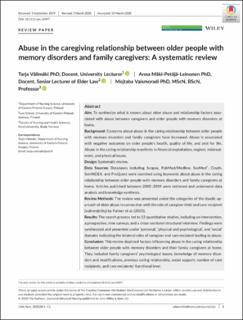Abuse in the caregiving relationship between older people with memory disorders and family caregivers : A systematic review
Peer reviewed, Journal article
Published version
Permanent lenke
https://hdl.handle.net/11250/2660952Utgivelsesdato
2020Metadata
Vis full innførselSamlinger
Originalversjon
Välimäki, T., Mäki‐Petäjä‐Leinonen, A. & Vaismoradi, M. (2020). Abuse in the caregiving relationship between older people with memory disorders and family caregivers: A systematic review. Journal of Advanced Nursing. doi: 10.1111/jan.14397Sammendrag
Aim
To synthesize what is known about elder abuse and relationship factors associated with abuse between caregivers and older people with memory disorders at home.
Background
Concerns about abuse in the caring relationship between older people with memory disorders and family caregivers have increased. Abuse is associated with negative outcomes on older people's health, quality of life, and zest for life. Abuse in the caring relationship manifests in financial exploitation, neglect, mistreatment, and physical issues.
Design
Systematic review.
Data Sources
Databases including Scopus, PubMed/Medline, SveMed+, Cinalh, SonINDEX, and ProQuest were searched using keywords about abuse in the caring relationship between older people with memory disorders and family caregivers at home. Articles published between 2005–2019 were retrieved and underwent data analysis and knowledge synthesis.
Review Methods
The review was presented under the categories of the dyadic approach of elder abuse in connection with the role of caregiver (risk) and care recipient (vulnerability) by Fulmer et al. (2005).
Results
The search process led to 12 quantitative studies, including an intervention, a prospective, nine surveys, and a cross‐sectional structural interview. Findings were synthesized and presented under ‘personal’, ‘physical and psychological’, and ‘social’ domains indicating the bilateral roles of caregiver and care recipient leading to abuse.
Conclusion
This review depicted factors influencing abuse in the caring relationship between older people with memory disorders and their family caregivers at home. They included family caregivers’ psychological issues, knowledge of memory disorders and modifications, previous caring relationship, social support, number of care recipients, and care recipients’ functional level.
Impact
This review identifies what influences elder abuse by family caregivers using the dyadic approach and explains how abuse can be prevented through suggested strategies.
The review findings are relevant to multidisciplinary healthcare providers and can guide the provision of support, screening and assessment, educational programs, and legislative initiatives.

